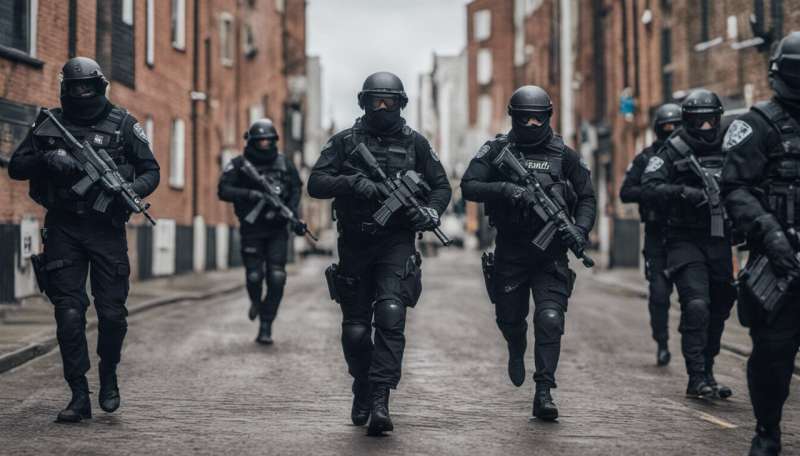This article has been reviewed according to Science X's editorial process and policies. Editors have highlighted the following attributes while ensuring the content's credibility:
fact-checked
trusted source
written by researcher(s)
proofread
The UK has relatively few armed police—but their specialist squads are hotbeds of 'warrior culture'

When unarmed black Briton Chris Kaba was killed by a single shot from a London Metropolitan police officer in September 2022, his family and communities of color demanded answers. A year later, they have the beginnings of one—the Crown Prosecution Service announced it was charging an officer with murder. In response, over 100 armed Met officers voluntarily stood down from firearms duties, suggesting they were alarmed by the decision to prosecute one of their own.
Armed police are relatively rare in the UK. Just 4% of the 142,526 officers in England and Wales are armed (compared to all 708,000 in the US). In England and Wales only 6,677 officers are authorized to carry firearms.
Of these, 2,500 are in the Met, Britain's largest police service. They are typically trained by the Met's specialist firearms command and serve either in that unit or other special squads like counter-terrorism, or parliamentary and diplomatic protection.
These units are prestigious, but are also known among police and researchers for being "closed shops"—having few female officers and officers of color. Yet they are given wide berth in conducting policing activities, which does little to instill public trust. Some of the worst actors in recent UK policing, including Wayne Couzens and David Carrick, have been part of these specialist squads.
My research has shown that these elite special units are hotbeds of the most warrior-like aspects of street police culture. They embody norms and values like hypermasculinity, insularity, competition and bias. They have adopted quasi-military attitudes, emphasizing use of violence, aggression, escalation and separation directed toward the people they are supposed to protect.
Baroness Louise Casey's review flagged similar problems with these elite units. She found the Met's firearms command was a 90% white male environment, where aggressive street police culture dominated and officers broke rules with relative impunity:
"Working in MO19 is seen as a prestigious and 'elite' part of the Met….This has led to a widely held view in the Command and in the rest of the Met that firearms officers 'need to be allowed' to bend or break the rules because they are volunteers who could at any point decide not to carry a firearm or 'hand in their blue card'."
In 2016, the NPCC sought to increase the numbers of trained armed officers by 1,500 on the basis of terrorism threats. As the total number of officers has also increased, the proportion of armed officers has remained around 4%-5%.
Militarizing the police
The arming of officers is part of a larger trend of militarization (incorporating military elements into policing) in the UK, US and elsewhere. This can be culturally, through responsibilities, assignments and strategies, or through the addition of tactical gear and weapons.
Studies suggest the influence of militarization on local police departments reinforces the most aggressive aspects of warrior street police culture. In militarized police departments, both supervisors and peers expect police officers to err on the side of control and order maintenance, even if it involves the use of violence.
This model reinforces the separation between police and the communities they serve. It may, in some cases, increase the speed with which they resort to violence against civilians with whom they feel little communal connection. Studies show a positive correlation between a police department's acquisition of militarized equipment and its use of deadly force.
While connections between the police and the military have existed for centuries, today the lines are increasingly blurred. In the UK, events including the Troubles, the 7/7 bombings and more recent terror attacks have all contributed to this. Police leaders argue they must become more militarized to better address rising terrorism threats.
But militarisation of police does not stay limited to the terrorism sphere. And problems arise when these principles creep into regular policing of homicide, drugs and knife crime. Research from the US suggests this may heighten armed police responses in these situations.
The military approach is at odds with what UK police are supposed to represent, and further erodes public confidence in police.
Holding officers to account
Met commissioner Mark Rowley has suggested that armed officers may need more protection. The Home Office has floated the idea of limits on criminal investigations into how armed police do their jobs.
But the reality is that efforts at accountability have, so far, not limited officers' ability to do their jobs. The current legal mechanisms to hold police to account for misconduct are insufficient. The criminal offenses of misconduct in public office which applies generally to public servants, or corruption by police officer, are poorly defined, with high thresholds for evidence and are therefore rarely applied.
Most police misconduct complaints from members of the public are handled by police services themselves. Of the 115,235 allegations against police in 2022, 87,786 were handled in-house, while 27,449 were handled externally. For complaints handled internally, 89.1% resulted in no action, and only 0.2% were referred for formal disciplinary proceedings.
Increased police misconduct is tied to decreased levels of trust and confidence in police. And when police departments are seen as mishandling misconduct incidents, this can be perceived as a lack of desire by the institution to hold offending officers to account.
While the outcry among armed officers suggests that increased accountability impedes their ability to do their jobs, the reality is that mechanisms to hold officers responsible for misconduct—even when a death has occurred—are few and far between. Rather than contesting close scrutiny, officers should embrace being held to the highest legal standards. It is sorely needed to increase public confidence in police.
Provided by The Conversation
This article is republished from The Conversation under a Creative Commons license. Read the original article.![]()




















